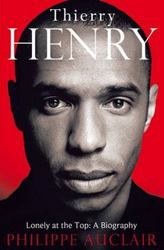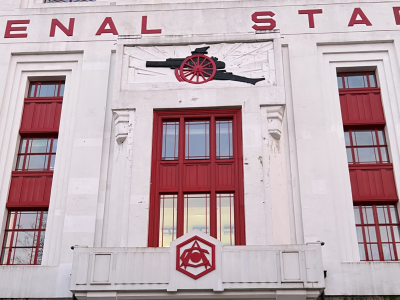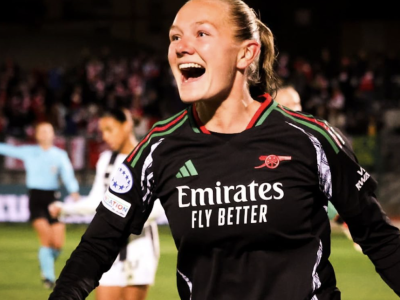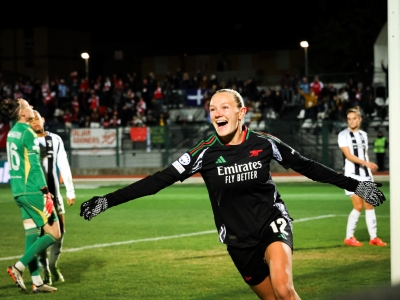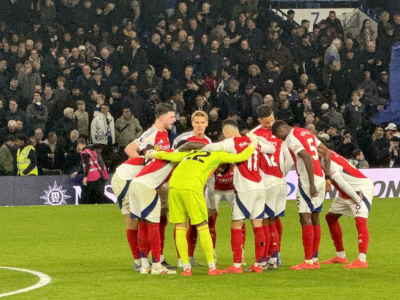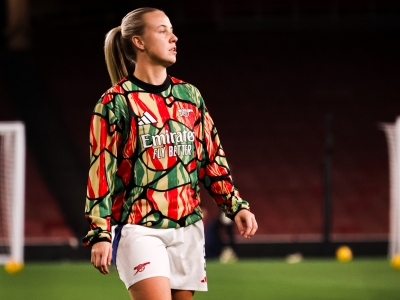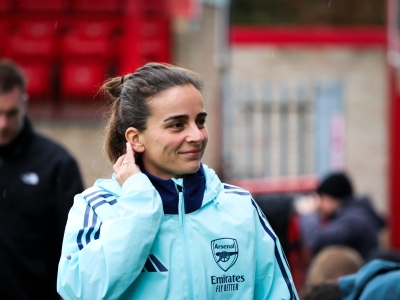Philippe Auclair’s biography of Thierry Henry was recently released in paperback format. In the autumn of 2012, the author gave an interview to The Gooner to talk about the book and his thoughts on Arsenal at the time, which was published across two issues of The Gooner. To mark the release of the paperback, we are reproducing the interview here…
The Gooner: The story of Thierry Henry is, at first sight, a fairly well-established and widely-known one, so what drew you to write about him in book form?
Philippe Auclair: My point would be - the story is not that well-known, in fact. Not that much is known of England of Thierry's career away from Arsenal, be it with Les Bleus (a very complicated affair, from his exclusion from the WC-winning team after the 1998 triumph to his role in the 2010 débacle, including his relationship with Zidane) or with his other clubs. The story of his highly controversial non-move/falsified contract from Monaco to Real Madrid, for example, hasn't been properly told outside of France. Similarly, his half-season at Juve is generally passed over, as if it hadn't had such a big impact on his career, when it most certainly did. The main thing, however, remains the huge discrepancy between the image and perception of the player and the man in France and in England. I also find it remarkable that no book has been written about him so far, be it in English or French, or in any other language, save for a purely factual account of his career by Oliver Derbyshire when Thierry was still in his pomp at AFC. Writing about Thierry, you come up with questions rather than answers, most of the time. That, in itself, makes it worthwhile
Henry’s arrival at Arsenal is generally assumed to be because Nicolas Anelka departed, yet the two played successfully together for France at Euro 2000. Do you think Wenger might have bought Henry even if Anelka had remained?
Arsène would have loved to play the two together and tried to buy Henry when he was still at Monaco. How they would have played I am not sure, as obviously Anelka would have been the central player, but as front pair, when you think about the amount of pace they had, it would have been incredible. So Wenger definitely thought about that.
You touch upon the last day at Highbury in the book, and I was intrigued by the idea that all the doors were left open and you could wander around the place. Can you describe the scene more fully, tell us what other kind of people were there, and was anyone helping themselves to souvenirs?
My main memory is definitely playing on the pitch. This was about 10.30 in the evening and I was slightly inebriated. There were about 40 or 50 people there, and several footballs. These were a mix of people who worked for the club, some of them stewards, and a few journalists with Arsenal in their hearts. We were just saying goodbye one last time really, and did things like sit in the boardroom and in the players’ communal bath. The kind of things you do when you have had a few drinks. But it was respectful. There wasn’t any mass pilfering as such.
You pinpoint the unfortunate departure of David Dein as the fundamental reason Henry decided to leave Arsenal. However, there was a fallout in late 2006 between the player and Arsène Wenger when Henry was not picked for the North London derby. Did they ever patch this up during that season, or do you think the rift had some bearing on Henry’s departure?
No. Henry has admitted he had disagreements with Wenger more than once. So this was not a huge factor. More significant, really, was his personal life, which out of respect I don’t go into in any depth in the book. Obviously he split up with his wife during his last year at Arsenal and that, along with Dein’s departure, were the two really significant factors. Thierry had set himself a career and lifeplan from an early age, which was to play for the national team, to play for Arsenal, to play for Barcelona and to experience life in the United States. It was really his last chance to join Barcelona, given his physical problems in his last season at Arsenal. The tiff with the manager in the middle of his last season in North London was pretty insignificant.
The team – without Henry - once again challenged seriously for the title in the season following his departure. Do you think he had become more of a handicap to its development than an asset?
Because of his importance to the team and the way that others relied on him to provide a solution, he perhaps prevented some of the younger players taking responsibility. At that stage, he was a far more remote figure and there was a mixture of awe, respect and trepidation to the extent that he was felt to be almost unapproachable by some members of the playing staff. In a way, it had shackled the team. When he was injured during that first season at the Emirates, it was as if the team was playing without its leader, producing a big hole in the system, which it didn’t adapt to. Once he goes, you have new leaders and a new style of play emerging. In that 2007-08 season, in terms of the aesthetic play, we saw some of the best we saw in the Wenger era. It certainly bears comparison to what we saw between 2001 and 2004 in terms of the quality of the play. It was a team that should have won the league. It was, in fact, hurt by what happened in the Champions League. Wenger told me the 2-0 victory in Milan cost him an awful lot, because suddenly agents started fluttering about players they might normally have left alone. Heads were turned, and perhaps some focus and concentration were lost by that as people were starting to talk about offers from big clubs.
What do you make of the notion that he might be back for another loan spell in the New Year. Do you think there is any serious likelihood of that?
I don’t think it s going to happen and I hope it doesn’t. Training with the Gunners is one thing, but to play for the team again, the situation is completely different. When he came last season, Arsenal were lacking forwards. Robin van Persie was the only player who was performing. This year is completely different. You’ve got Olivier Giroud, who is finding his feet, Lukas Podolski can play centre-forward and you can imagine Theo Walcott as an option. There should be enough firepower there. Also Thierry is now in his 36th year, an age by which every month that goes by has a serious effect on your ability to compete physically. He had a decent season with the Red Bulls, but the chasm between the Premier League and the MLS is as big as ever. And I also hope it doesn’t happen, because what happened last time was so magnificent that I can’t see it getting any better than that. It was just a perfect final full-stop to his Arsenal career. The goal against Leeds was such an extraordinary moment for Arsenal fans, for Thierry and for the whole of English football. How can you add to that? It’s like doing the best gig of your life, culminating in the perfect encore, and then when half the people have left the audience, coming back and doing another song. What is the point in that?
It seems obvious that Henry is going to try his hand as a manager in the future, although his not communicating with younger players much when he was a captain does not suggest he has the personality for the job. What are your thoughts as to his capability to be a successful manager?
As far as tactical understanding and capacity to analyse the game, absolutely outstanding. In terms of the personality, he would have to do himself violence, because he is not a natural-born speaker, a great motivator à la Vieira. In terms of man-management, he would find it quite difficult because he does have quite a prickly personality. He would agree with that. The one thing he is, is a great judge of a player. I could imagine him as a director of football or responsible for a scouting network because his knowledge of the game is remarkable. He knows everything that is happening and is obviously well connected. And his attitude to the media has changed a lot over the years. He’s become more remote, and it’s not a part of the job he enjoys at all. If you asked me, could he become the manager of Arsenal, I would have huge doubts, whereas with someone like Patrick Vieira, I could see that happening.
The player has won pretty much every major honour in the game. What do you believe is his biggest regret?
Not winning the Champions League with Arsenal.
Was Henry aware that you were writing this book?
Yes, he was. I notified him in writing when he was at Barcelona and had the chance to talk to him directly when he came back to London at one stage and made sure he was aware I was preparing a biography.
You describe in the book how Arsène Wenger needed to follow his policy of investment in youth because of the stadium move and the age of many of the Invincibles. However, he relied on young players feeling the attachment to the club that the likes of Henry, Vieira, Bergkamp and Pires developed to make it work. Why do you think this has not happened?
Two main things. A generational gap. It’s not just valid to Arsenal players. Any person involved in professional football will tell you that, between Henry’s generation and the players that have appeared in the 2000s, there is a huge gap because football has economically exploded and the rewards are far greater at a far younger age. The influence of agents – especially in France – has been multiplied twentyfold. When Thierry Henry made his first move, he didn’t have an agent. Now, any player at Clairefontaine would have had an agent for four years. It is hard to get the new players to adhere to the traditional values. When Vieira and Henry moved to Arsenal, they experienced immediate success. A team that succeeds will quite naturally develop a sense of unity and common purpose. When you are not winning, you start thinking about yourself much more. The only players that had won anything at Arsenal have now all left. The federating effect of a trophy hasn’t happened, which is why the defeat in the League Cup against Birmingham was such a setback; in spite of its not being a major trophy, it was absolutely crucial. The first trophy that Jose Mourinho won with Chelsea was the League Cup, and that was a stepping stone. Arsenal needed that stepping stone to keep those players together. If Fabregas had been convinced there was greater success to come, he might have stayed.
In the book, you use the notion of, and I quote, “A personality vacuum” in the team, when talking about Henry’s final days at Arsenal, which I feel is still relevant today. Do you think Wenger really appreciates the value of a true leader, in the Tony Adams/Frank McLintock mode, because he does not seem to court that type of player.
I think he does court them. Vieira was already a leader, even at the age of 20. He was a captain at Cannes. Sol Campbell was a leader. So Wenger is not averse to leaders. I think Jack Wilshere can become a leader. Jens Lehmann was a leader. So Arsène Wenger does not have a leaderphobia. These leaders – how many of them are in contemporary football?
Well the obvious names are the likes of Terry and Gerrard
Ok, but that’s an older generation. If you look at younger players around European and world football, there are not many leaders there. Look at Germany. They have great technical players, but no leaders, which is why they have not won a trophy. Schweinsteiger is not a leader, Philip Lahm is not a leader, even though he is the captain. Look at Spain. Casillas and Puyol are genuine leaders, but they are getting on. There are no younger natural leaders. They are the rarest and most precious commodity in world football at the moment. Yaya Touré is a leader, definitely. Vincent Kompany is a leader. Older players. It is something that is missing from so many teams at the moment. It might have been magnified at Arsenal because of the financial constraints put on Arsène Wenger’s transfer policy, where he focused on youth, perhaps hoping that, out of this, natural born leaders would emerge. I think we are clutching at straws here because it is not an Arsenal-specific problem.
Why do you think Arsenal have been playing so poorly over the last couple of months?
If you analyse how the ball is passed, for some reason, the ball is going laterally and backwards and more slowly across the surface. Players tend to receive the ball more with their back to goal and not in the direction of their runs. The whole thing has slowed down, and so much of the way Wenger wants his players to play is about rhythm and tempo. It is enough, if you are slightly upbeat, to have huge consequences on your efficiency. The loss of Abou Diaby has been a major factor, as he can inject tempo and find a telling pass in tight situations. Ramsey, Arteta and Coquelin are not that type of player. The decline in Arsenal’s quality since Diaby has been out of the team is not a coincidence, although at least Jack Wilshere is back now. Injuries have played a large role. I don’t understand why Andrey Arshavin is not used more in the team when it is crying out for a player who will take risks. Gervinho has been missed as well, as he has the capacity to burst through on the wing, create space and take on players. There has been very little rotation, except that which has been forced by injuries. It’s the same team week after week. And it’s looked a little bit jaded. And at this stage of the season, you have to ask yourself, why? We are in mid-November. They have not played in more matches than normal. Other teams do not seem so affected by it in terms of physical capacity.
You are an admitted Arsenal supporter. Are you concerned about the long-term direction of the club?
Yes. I am a member of the Fanshare scheme. I think the current situation is in one way the least damaging because it is a form of stasis. And you wonder what would happen if there was a direct confrontation between Kroenke and Usmanov. At least there is an easy equilibrium at the moment, but in name only, but it cannot carry on like that. You cannot have an absentee owner with so many franchises for whom Arsenal is only an economic concern. I think it is ludicrous that Alisher Usmanov is not going to get the opportunity to have representation on the board. I don’t see a board that is doing anything to send out a message that connects with the fans, which is creating a problem. The gap between the fans and the board is widening. The AGM was a demonstration of that. There is genuine disaffection with what is happening. The current situation is not one that can drive the club forward. There has to be a decision and we are all waiting for the moment when Stan Kroenke declares his hand. He’s not an Arsenal fan. He’s not a Roman Abramovich, who is a genuine football fan, whatever you think of him. At Manchester City, it is a long term sporting project with specific aims. I can’t see how the current situation at board level can carry on. It puts Wenger in such an awkward position. For years he was saying he was so happy at Arsenal because he had the full backing of the board. But that was when Danny Fiszman and David Dein were there. Things have changed completely since then. Wenger is taking all the flak because he doesn’t spend. The board says he has money to spend, but then you hear Wenger saying he uses all the money that is put at his disposal, which is not exactly the same message. It’s conflicting. My perception on Kroenke is that he is waiting for the shares to gain so much value that he can make a fantastic profit by selling to the highest bidder.
If Arsène were run over by a bus tomorrow, who would be his best replacement?
Hmmm, that’s a real curveball. I will give you a shortlist. In a few years’ time, my heart and soul would say Dennis Bergkamp, once he has been through everything, but that’s a purely sentimental choice. Otherwise, if I am looking within England, Roberto Martinez. I admire his philosophy of football. I am fascinated by what De Boer is doing at Ajax at the moment, but you would have to take the whole structure. Pep Guardiola is the obvious fit, with the tradition of playing and the academy. He speaks perfect English. The managers at Malaga (Manuel Pellegrini) and Inter (Andrea Stramaccioni) are also pretty interesting. There’s a number of younger managers coming through. The Italian team boss, Cesare Prandelli, and Dortmund’s Jurgen Klopp are other examples. Mircea Lucescu at Shakhtar Donetsk would also be a perfect fit. But Arsène does not take the bus very often and there aren’t many going through Totteridge!
Lonely At The Top is published by MacMillan in paperback. It has an rrp of £8.99, but can be bought from online book retailers for £6.47.

